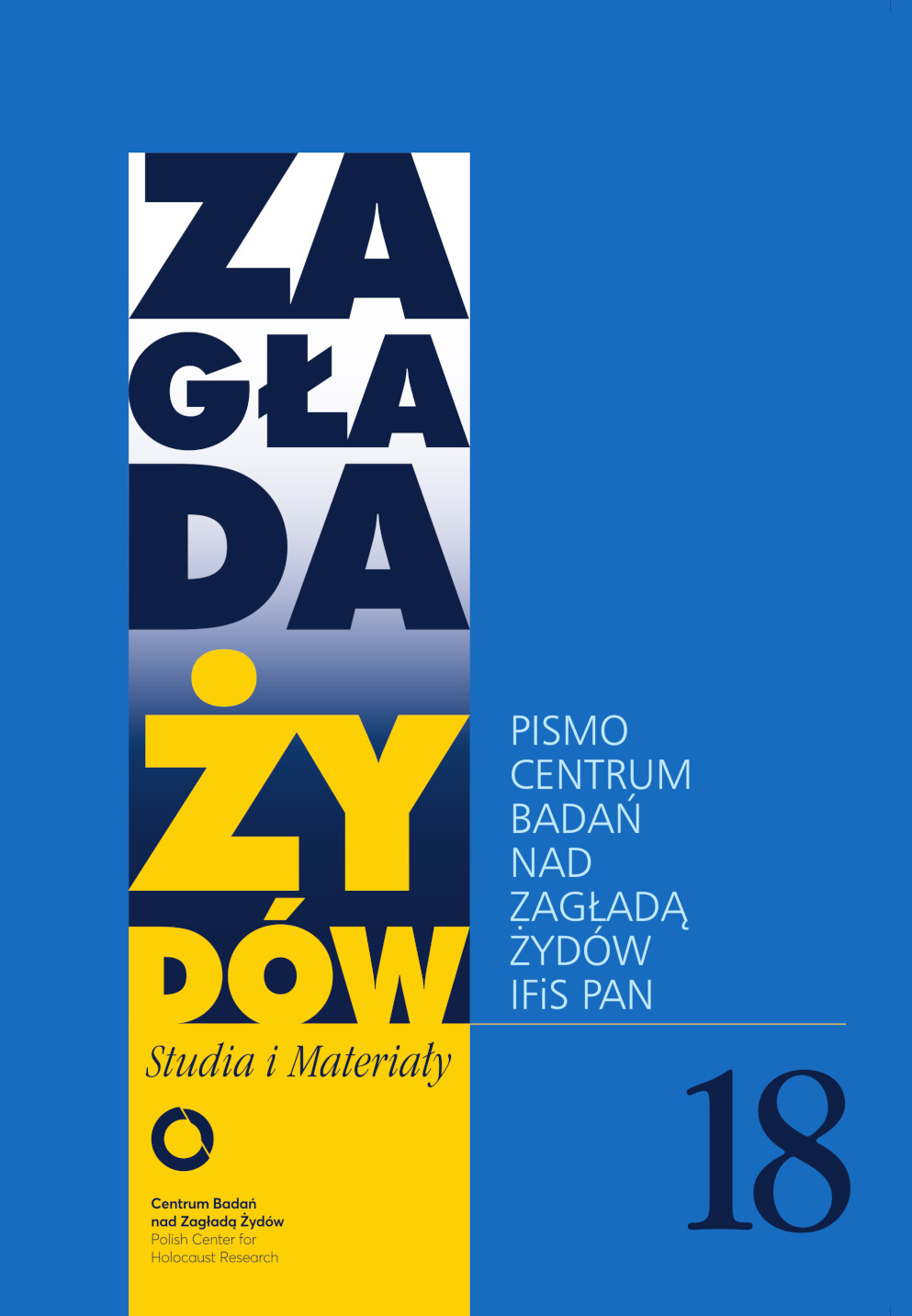A Study of a Case (Even If of an Unusual One) or a Study of Cultural General History? [Maria Ferenc, Każdy pyta co z nami będzie. Mieszkańcy getta warszawskiego wobec wiadomości o wojnie i Zagładzie]
Zagłada Żydów. Studia i Materiały, No. 18 (2022), Pages: 599-613
Submission Date: 2023-03-10Publication Date: 2023-03-11
 https://doi.org/10.32927/zzsim.974
https://doi.org/10.32927/zzsim.974
Abstract
The author of the book reviewed analyzed the channels through which news about what was happening beyond the Warsaw Ghetto walls filtered inside it – directly and on the front lines of World War II. This important topic only rarely attracts historians’ attention. But the reviewer is interested in which issues often studied by historians can be illuminated by the extreme ghetto situation. These issues are highly diverse. One is the spread of news in different societies and conditions, another one is the act of analyzing the news through the prism of past historical events known to the given community.
References
Apel Aleksandra Edelmana do prezydenta Stanów Zjednoczonych i przywódców wolnego świata, Wyborcza.pl, 24 III 2022, https://wyborcza.pl/7,162657,28256974,apel-aleksandra-edelmana-do-prezydenta-stanow-zjednoczonych.html.
Google Scholar
Bartoszewski Władysław, Skąd pan jest? Wywiad rzeka, rozmawia Michał Komar, Warszawa: Świat Książki, 2006.
Google Scholar
Buchheim Lothar Günther, Okręt, tłum. Adam Kaska, Warszawa: Wydawnictwo MON,1988.
Google Scholar
Gebert Konstanty, Ostateczne rozwiązania. Ludobójcy i ich dzieło, Warszawa: Agora, 2022. Hen Józef, Nowolipie, Warszawa: Iskry, 1991.
Google Scholar
Kisielewski Stefan, Reakcjonista. Autobiografia intelektualna, wybór i oprac. Małgorzata Sopyło, Warszawa: Ośrodek Karta, 2021.
Google Scholar
Korzeniewski Bohdan, Było, minęło… Wspomnienia, przedmowa Anna Kuligowska-Korzeniewska, posłowie Andrzej Kruszyński, Warszawa: PIW, 2020.
Google Scholar
Machcewicz Maciej, „Przecież jutro wyjedziemy do kraju, do Polski”. Życie codzienne polskich zesłańców na Syberii w latach 1940–1946, „Zesłaniec. Kwartalnik Rady Naukowej Zarządu Głównego Związku Sybiraków” 2015, nr 62.
Google Scholar
Milewska Irena, (En)quête de famille, współpraca Genevièce Pichon, Paris: Le Manucrit, 2020.
Google Scholar
Nijakowski Lech M., Ludobójstwo. Historia i socjologia ludzkiej destrukcyjności. Popularne wprowadzenie, Warszawa: Iskry, 2018.
Google Scholar
Nijakowski Lech M., Rozkosz zemsty. Socjologia historyczna mobilizacji ludobójczej, Warszawa: Wydawnictwo Naukowe Scholar, 2013
Google Scholar
License
Copyright (c) 2023 Author&"Holocaust Studies and Materials"

This work is licensed under a Creative Commons Attribution 4.0 International License.
https://creativecommons.org/licenses/by/4.0
The journal is published under the Diamond Open Access Standard, CC-BY-4.0 Deed - Attribution 4.0 International - Creative Commons
Most read articles by the same author(s)
- Marcin Kula, To the parade – or to psychotherapy? Michał Bilewicz, Traumaland. Polacy w cieniu przeszłości , Zagłada Żydów. Studia i Materiały: No. 20 (2024)
- Marcin Kula, In the First Circle. Letters of a Man in Hiding , Zagłada Żydów. Studia i Materiały: No. 16 (2020)
- Marcin Kula, Document Drawer [Czarna księga, red. Wasilij Grossman, Ilja Erenburg, oprac. Joanna Nalewajko-Kulikov] , Zagłada Żydów. Studia i Materiały: No. 17 (2021)
- Marcin Kula, Parts of the picture may be wrong, but the whole is most certainly true. Jedwabne, Radziłów, Wąsosz… [Mirosław Tryczyk, Miasta śmierci] , Zagłada Żydów. Studia i Materiały: No. 17 (2021)
- Marcin Kula, Reflections after Reading The Behemoth , Zagłada Żydów. Studia i Materiały: No. 12 (2016)
- Kula Marcin, Auschwitz as a Social fact , Zagłada Żydów. Studia i Materiały: No. 2 (2006)
- Marcin Kula, The Celebrations of March 1968 Have Come to an End so Let Us Discuss It yet Again from the Perspective of Long Duration , Zagłada Żydów. Studia i Materiały: No. 14 (2018)
Similar Articles
- Marta Duch-Dyngosz, In Search of Local Memory of the Holocaust. The Case of Commemoration of Jewish Communities in Smaller Towns in Contemporary Poland , Zagłada Żydów. Studia i Materiały: No. 17 (2021)
- Dariusz Libionka, Adam Kopciowski, The Life and the Holocaust in Hrubieszów in the Eyes of a Young Woman from Warsaw , Zagłada Żydów. Studia i Materiały: No. 3 (2007)
- Gabriel Finder, Bernard Mark, the Uprising in the Warsaw Ghetto, and Jürgen Stroop’s Trial , Zagłada Żydów. Studia i Materiały: No. 13 (2017)
- Marta Janczewska, Research on Starvation in the Warsaw Ghetto – Ethical Problems , Zagłada Żydów. Studia i Materiały: 2010: Holocaust Studies and Materials
- Jacek Leociak, Understanding the Holocaust. A Task for Generations , Zagłada Żydów. Studia i Materiały: 2008: Holocaust Studies and Materials
- Jacek Leociak, Anniversaries of the Warsaw Ghetto Uprising in public discourse (with special reference to the years 1943–1944, 1968 and 2023) , Zagłada Żydów. Studia i Materiały: No. 19 (2023)
- Sylweriusz B. Królak, Strolling in the Ghetto. Experience of the Space of the Łódź and Warsaw Ghettoes from a Pedestrian’s Perspective , Zagłada Żydów. Studia i Materiały: No. 16 (2020)
- Adam Kopciowski, Pinkes Warsze - Warsaw Chronicle , Zagłada Żydów. Studia i Materiały: No. 10 (2014)
- Katarzyna Person, Hersz Wasser: The Archive Secretary , Zagłada Żydów. Studia i Materiały: No. 10 (2014)
- Andrzej Czyżewski, The Marginalized, Unwanted, and Silent Memory… – Łódź Ghetto in Communist Poland’s Politics of Memory , Zagłada Żydów. Studia i Materiały: No. 16 (2020)
1 2 3 4 5 6 7 8 9 10 11 12 13 14 15 16 17 18 19 20 21 22 23 24 25 26 27 28 29 30 31 32 33 34 35 36 37 38 39 40 41 42 43 44 45 46 47 48 49 50 > >>
You may also start an advanced similarity search for this article.
 English
English
 Język Polski
Język Polski



 https://orcid.org/0000-0002-2539-6895
https://orcid.org/0000-0002-2539-6895





